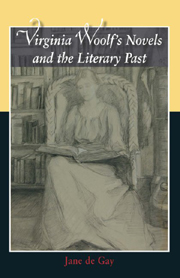Book contents
- Frontmatter
- Contents
- Acknowledgements
- Abbreviations
- Introduction
- 1 From Woman Reader to Woman Writer: The Voyage Out
- 2 Tradition and Exploration in Night and Day
- 3 Literature and Survival: Jacob's Room and Mrs Dalloway
- 4 To the Lighthouse and the Ghost of Leslie Stephen
- 5 Rewriting Literary History in Orlando
- 6 ‘Lives Together’: Literary and Spiritual Autobiographies in The Waves
- 7 Bringing the Literary Past to Life in Between the Acts
- Conclusion
- Select Bibliography
- Index
7 - Bringing the Literary Past to Life in Between the Acts
Published online by Cambridge University Press: 12 September 2012
- Frontmatter
- Contents
- Acknowledgements
- Abbreviations
- Introduction
- 1 From Woman Reader to Woman Writer: The Voyage Out
- 2 Tradition and Exploration in Night and Day
- 3 Literature and Survival: Jacob's Room and Mrs Dalloway
- 4 To the Lighthouse and the Ghost of Leslie Stephen
- 5 Rewriting Literary History in Orlando
- 6 ‘Lives Together’: Literary and Spiritual Autobiographies in The Waves
- 7 Bringing the Literary Past to Life in Between the Acts
- Conclusion
- Select Bibliography
- Index
Summary
Virginia Woolf's engagement with the literary past was at its most urgent and intense in Between the Acts. Written against the backdrop of the escalation of the Fascist threat and the outbreak of the Second World War, a period Woolf feared might signal ‘the complete ruin not only of civilization in Europe, but of our last lap’ (D, V. 162), it betrays a concern to preserve a threatened culture in writing. Set in June 1939, shortly before the outbreak of war, the novel encapsulates a form of English society which was about to disappear. Literature is given a prominent place within this account, both in Miss La Trobe's pageant, which parodies several phases of English literary history and is peppered with allusions, and in the collection of glancing allusions, quotations and misquotations which, as Gillian Beer has noted, are ‘combed through’ the novel as a whole. However, the novel also reflects an awareness of the difficulties and dangers both in looking back to the literary past and in writing new work at such a crucial point in world history. This awareness was prominent in Woolf's non-fiction at the time and forms a significant part of the dynamic of Between the Acts.
Woolf's ambivalence about the value and relevance of literature at a time of danger is central to her argument in Three Guineas about whether it is possible to prevent war by protecting culture and intellectual liberty.
- Type
- Chapter
- Information
- Virginia Woolf's Novels and the Literary Past , pp. 186 - 211Publisher: Edinburgh University PressPrint publication year: 2006



